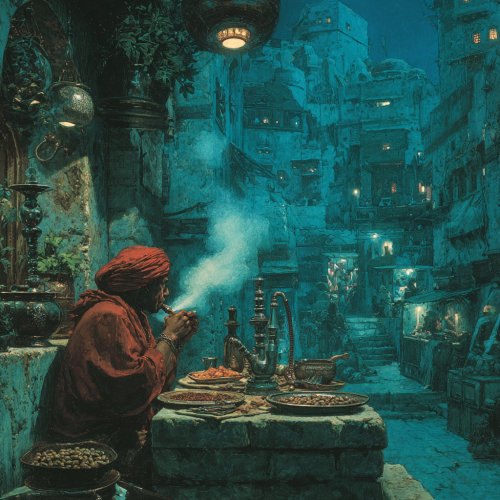The Djinn of Sayarii
An excerpt from “On the Unseen Neighbors” by H. Il-Tebari, University of Thaumaturgic Studies, Il-Wāāt ul’Ihāt Kathira
The Hidden Nation
It is said that no city of Sayarii stands entirely alone.
Beneath every marketplace, behind every argument, within every desert wind, another nation breathes beside us — unseen, ageless, and patient.
We call them the Djinn.
They are not elementals, nor spirits of air and flame as the superstitious insist, but citizens of a parallel world woven through our own — a civilization built from the same magical currents that once nourished all life before the Karithat ul’Qadima.
Where we see sand and stone, they see rivers of light.
Where we walk by sun and shadow, they drift through the pulse that still hums beneath creation.
Of Nature and Form
The Djinn are made of pattern, not matter.
Their essence is drawn from the surviving currents that cross Sayarii — remnants of the old world’s living magic.
They shape themselves from memory and desire, wearing faces they have borrowed from dreams.
In full sight they appear almost human, yet never convincingly so: the eyes reflect too much light, the voice echoes a heartbeat late, the air bends around them like heat above a kiln.
They do not die, but they may fade.
When forgotten, a Djinn unravels back into the current that birthed it, leaving only the faint smell of rain on dry stone.
Politics of the Unseen
The Djinn are not solitary wanderers; they maintain their own courts and alliances, invisible to most mortals.
-
The Courts of Smoke rule within great cities — unseen councils whispering through guilds and dynasties.
-
The Nomad Clans travel with caravans and ships, steering winds and luck for payment in stories.
-
The Hidden Houses guard the ruins of the Fallen Age, claiming them as ancestral estates.
Their rivalries are ancient, their treaties older still.
To them, our wars and empires are simply surface weather over the deeper flow.
Anchors and Bargains
No Djinn may remain long in the waking world without an anchor — a bond to an object, place, or living soul that gives their pattern weight.
Such bindings are rarely chains; they are agreements, mutually beneficial and perilous alike.
A fountain may host a House Djinn, ensuring its water never runs dry.
A Fleet Djinn may inhabit a ship’s figurehead, steering trade winds for a share of profit and song.
Scholars speak of Jar Djinn, bound within black-platinum amphorae, trading counsel for company.
Each binding is a contract written in whispers, and few mortals understand all its clauses.
On Their Motives
Why the Djinn meddle in mortal affairs remains uncertain.
Some seem drawn by affection, others by curiosity, others still by the lingering scent of power we squander.
They say we are the echo of their echo — cousins who lost our birthright when the gods sealed the currents.
To help us is to help themselves; to harm us is, perhaps, to remind us of what we were.
Encounters and Warnings
-
Signs of Presence: sudden drafts, reversed echoes, reflections that do not match motion, the scent of wet stone after long drought.
-
Taboos: never promise “as the wind wills it”; those words are invitation. Never curse the air by name; it listens.
-
Favors: A Djinn’s favor is a loan against memory. What it takes in return may not be gold or blood but a choice you have not yet made.
Scholarly Consensus (Such as It Is)
No instrument has yet measured a Djinn directly.
We chart their wake as we would the passage of a fish through dark water — by turbulence, by silence, by absence.
Still, patterns emerge: wherever the hidden currents surge, Djinn are near; wherever they quarrel, storms rise.
The Faculty of Thaumaturgic Studies holds that the Djinn are the last natural conductors of pure magic.
We, cut off from that current, now live by theft and imitation — feathers, distillates, engines.
The Djinn need none of these. They are the current remembering itself.
Closing Words
“If you wish to see a Djinn,” the proverb says, “watch the empty chair at your table, and ask who else it is waiting for.”
In our arrogance we built engines to command the world.
In our ruin, we forgot that something still listens.
They do not rule us, nor we them — yet all the same, we share the same breath.

Topic:
Worldbuilding Sayarii Lore Sayarii Politics Magic - Thaumaturgy